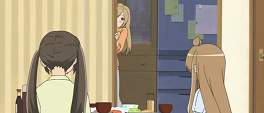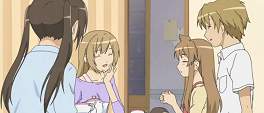That is the smell of familiarity; tried-and-tested, often copied but rarely bettered, it's the smell of all-girl school comedy. Treading in the territory of giants such as Azumanga Daioh and recently Lucky Star, Minami-ke has had the bar set very highly for it. Whether you enjoy the slice-of-life monotony or the genuine, sometimes slapstick humour, the series has a lot going for it. However its real test will certainly be whether it can maintain such a standard throughout its run.
Attempting to mix-up the formula somewhat, Minami-ke not only introduces a select number of male characters (currently only one) but breaks up the ordinary three sister group dynamic into home and school life, the latter of which is split across three different age ranges and subsequently three different schools. This is a superb move as it highlights one of the primary sources of humour for the series: age difference. In the first three episodes alone there are numerous times when Chiaki, the youngest, innocently asks about a topic ("weird activities" being the most prolific) while Kana, the hyperactive middle child, blithely continues rambling and Haruka, the eldest, is left to blush and to try and change the topic. It's not a great change from the otaku-tinged chattering of Lucky Star or the off-the-wall dialogues in Azumanga but it works by at once being age-specific while highlighting that there isn't any fundamental difference in what the different groups talk about.
The series certainly fulfils in terms of comedy with an excellent ear for timing and a great look at exaggerated sibling rivalries. When dealing with slice-of-life comedies such as Minami-ke does, the longevity is of primary concern as with no plot or significant character development to rely on, the onus is very much of the script and humour. There is an interesting twist in this regard as a second series, still called Minami-ke but with the colon'ed suffix of "Okawari", has been developed by a wholly different studio (asread versus Doumu) but still based on the same manga by Koharu Sakuraba. With two different takes on the same school and family dynamic, it will be interesting to see how each series differs, or not as the case may be.
While strong characters and good writing grace the series in equal measure, it's not all positive. The third episode in particular shows that Minami-ke has either the fortitude or lack of sense to run with an initially amusing scene but one which rapidly sinks into tedium; worrying, but not something to break an otherwise entertaining episode. The character given the most screen time is also (or perhaps because of this) the least likeable: the boisterous and unfortunately less than intelligent Kana whose antics oscillate between charming and tiresome; it's only when her natural foil, Chiaki, is present that the humour really begins to flow. Indeed, the dead-pan tone of Chiaki is best used when around her sisters rather than her adoring classmates; and with only a single scene of Haruka outside of her home environment, it's difficult not to think of the school sections as interstitials either end of the home-life meat of the show.
At only a projected thirteen episodes before the "new" series starts, Minami-ke is unlikely to outstay its welcome and there are enough laughs and general tomfoolery to be immensely enjoyable. The opening and ending songs are suitably innocuous and effervescent while the animation is serviceable and the only aesthetic oddity is the tear-drop shaped mouths. The second series will have a tough job following the first, it will be required to prove that it is different enough to be worthwhile or amusing enough to be considered a continuation; unless it is an entire reimagining, it could do worse than continue with the humour but with a fresh take. That is of course a discussion for the new year, and despite minor, niggling points, Minami-ke has an excellent set of introductory episodes.







